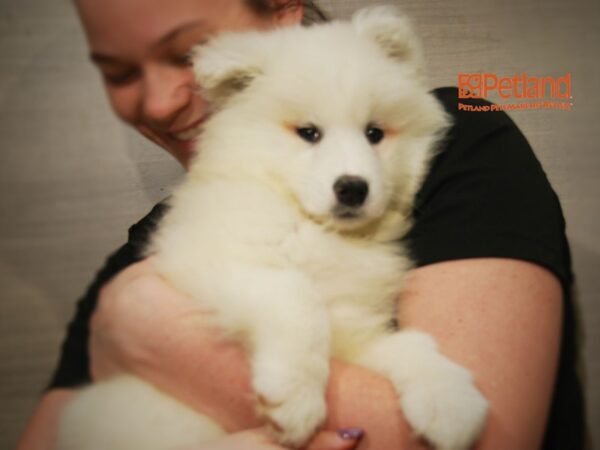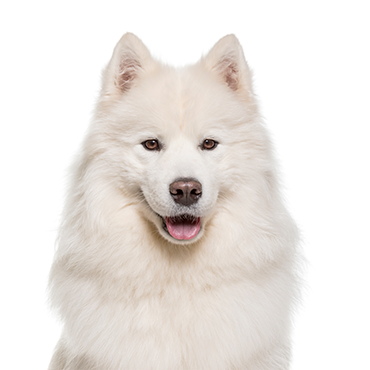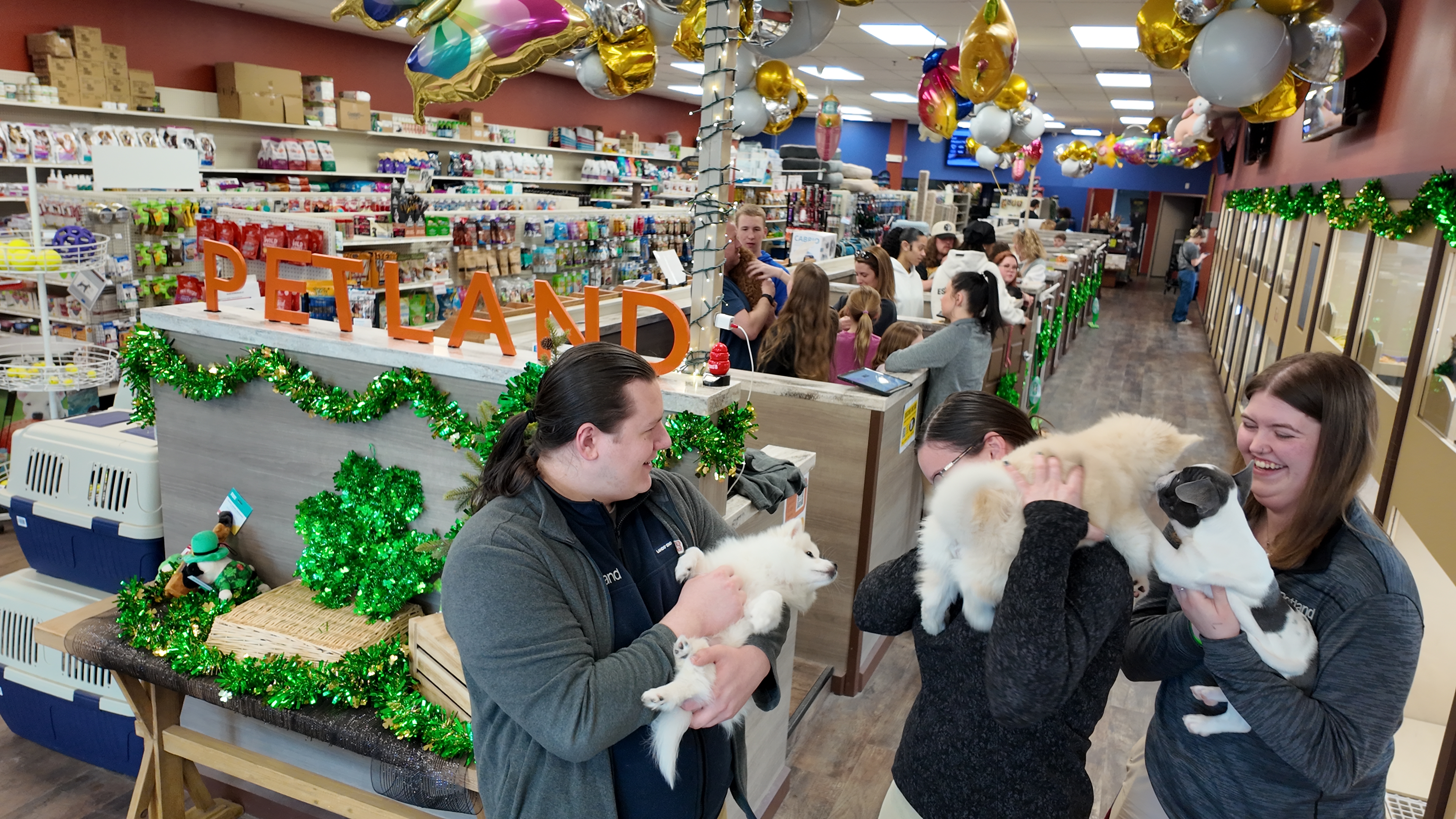Please create a free account below, or login by clicking here.
Petland Iowa City, Iowa
 Adopted
Adopted
Status
Adopted
Reference ID
16118
Birth Date
12-26-2019
Gender
Male
Color
White
Please fill out our contact form below.
"*" indicates required fields

The white lively Samoyed breed besides being known for the role it played in herding amongst the Siberians, is a good domestic animal. Their thick white coat makes them attractive at first sight while their sociable nature keeps them around longer. Discover more about our Samoyed puppies for sale below!
Breed History
The Samoyeds are a spitz-type dog known to have originated from Siberia. The Nenets—a group of people in the Northern Samoyeds from which the Samoyed breed gets its name—trained the dogs to be used in hunting and herding of reindeer. They are a breed from the lineage of the Nenet laikas which had a wider variety of coat colors.
By the 20th Century, they were on their way to the Antarctic, pulling sleds as they went. A group of them went on expeditions with Fridtjof Nansen and Ernest Shackleton (on different expeditions) and only the strongest of the group survived.
A number of standards have been published for the Samoyed breed but the first was released in 1909 after the breed had made its way to England.
Temperament
Samoyeds are as playful as they look. They are smart, obedient and their curious nature could lead them into mischievous deeds but other than that, they are friendly pets. This does not take away the need for training and supervision as they can be a handful when left alone.
When a Samoyed comes across a stranger, it may bark to let the owner know that someone new is around the block but their playful nature usually gets in the way and it quickly welcomes the person by wagging its tail. They enjoy the company of people, animals and anything that can be “herded” because of the nomadic traits they possess.
Environment.
Although Samoyeds do not pose a lot of problems, they should not be kept in confined areas. They love to play and run around and as such, require adequate space to carry out their daily activities. A well-fenced yard devoid of harmful elements would make a good home for Samoyeds. This space should be close enough to the residence to aid supervision and if allowed to wander into the home, the dog should be monitored to prevent it from turning appliances into toys.
Exercise.
Being lovers of fun, the Samoyed breed requires a reasonable level of exercise on a daily or weekly basis. In addition to this, the Samoyeds are prone to becoming overweight since they eat a lot and regular exercises would help keep them in check.
Being good herders, they love to pull things around including the one holding the leash so it is important to train the dog to listen to simple commands which would be useful in times when they cannot get a grip of themselves.
Grooming.
As a result of the highly-dense coat they possess, the Samoyeds require a high level of maintenance. Besides the expected period when they blow their coat, strands of fur get detached regularly as they run around.
Also, their sleek white coat may get stained in the process and as such, would require regular baths. All of these factors make the dog time and energy demanding which every prospective owner should gear up for.
They rate low when it comes to drooling but this is almost unavoidable when they wag their tails to welcome you home. As mentioned earlier, they have large appetites but this can be regulated with consistent training.
Our Samoyed puppies for sale come from either USDA licensed commercial breeders or hobby breeders with no more than 5 breeding mothers. USDA licensed commercial breeders account for less than 20% of all breeders in the country.
The unregulated breeders who are selling outside of the USDA regulations and without a license are what we consider to be “Puppy Mills.” We are committed to offering Samoyed puppies who will grow up to become important members of your family. We only purchase puppies from the very best sources, and we stand behind every puppy we sell.
Contact us today to learn more about the availability of our Samoyed puppies for sale. We look forward to helping you find your next family member. Our pet counselors can answer any questions you have about our Samoyed puppies.
Frequently Asked Questions about Samoyed
Do Samoyed make good family dogs?
Yes, they do. Their friendly and sociable nature makes them suitable to be bred at home.
Can Samoyeds survive in hot climates?
Yes. The thick coat they possess shields their bodies from extreme cold or heat.
Are all Samoyeds white?
Yes. All Samoyed breeds have a white coat. It is one of their qualities.
Are Samoyeds expensive?
The cost of any puppy varies. Contact us today to learn more about the availability and cost of this puppy.
Are Samoyed hypoallergenic?
Yes, they are.
Can you shave Samoyed fur?
As you already know, their coat acts as a shield against harsh weather conditions so shaving it off would be a bad idea.
Can Samoyeds swim?
Samoyeds can rescue themselves from drowning if they happen to be in such a situation but getting in the water is not something they would readily do.
Do Samoyed chase cats?
Samoyeds chase cats for fun but to prevent the fun from going wild, it is important to train them and keep an eye on them while they run around.
Are Samoyeds easy to train?
Samoyeds are not headstrong which makes them a rather easy breed to train.
Do Samoyed shed a lot?
Based on frequency, the Samoyeds do not shed a lot as this process only happens once or twice a year but when they do shed, it is really heavy owing to the double coat they have.




Image Not Found
Bringing home a new pet is an exciting milestone, but choosing where to find your furry family member can be challenging. Petland has established itself as a reliable and compas...

That adorable puppy isn’t just cute; it’s a complex creature needing specific things — understanding what makes a puppy thrive is key to their happiness and de...

So, you’re thinking about getting a puppy from Petland? Get ready because you’re not just taking home a bundle of furry joy. You’re also getting a full-on star...



Bringing home a new puppy is like adding a little tornado of energy to your life. They zoom around, chew on everything, and look at you with those big, eager eyes that say, R...



Bringing a dog into your family is a big decision that comes with lots of joy, responsibility, and, of course, plenty of tail wags. With so many breeds to choose from, finding t...

So, you’ve decided to add a four-legged best friend to your life—congrats! But now comes the hard part… which breed is right for you? Choosing a dog isn’...
Trustindex verifies that the original source of the review is Google. Tori was great and super helpful!!!Trustindex verifies that the original source of the review is Google. We came in to browse and Tori was extremely helpful with all of our questions. We had a great time!Trustindex verifies that the original source of the review is Google. Had so much fun playing with puppiesTrustindex verifies that the original source of the review is Google. Very nice clean store. The staff was very informative and knowledgeable about the pets we were looking at. All of the puppies we were with very healthy and happy.Trustindex verifies that the original source of the review is Google. Anna helped us immediately when we came in she pulled out our first 2 dogs and was supper sweetTrustindex verifies that the original source of the review is Google. I went here to look at some kittens and i was NOT disappointed. Kai and Anna were so sweet and let me have some play time with them!!!
"*" indicates required fields
"*" indicates required fields